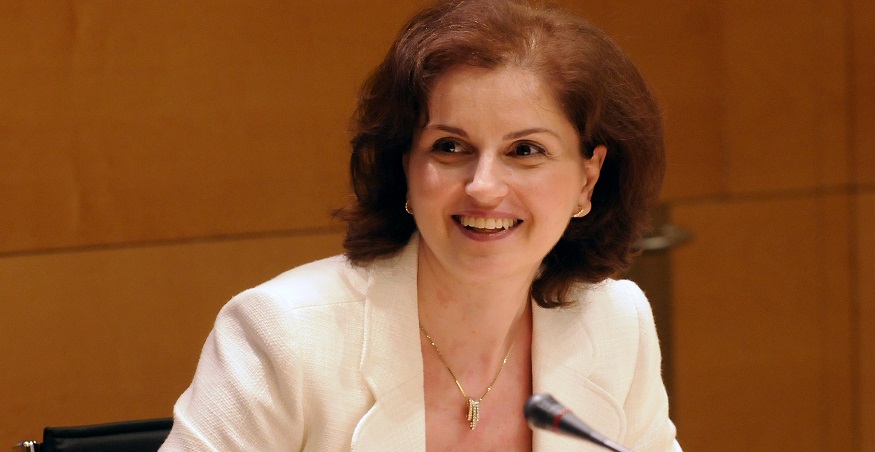Keep believing in what you do! - Interview with Marina Ranga, CEO and Founder of Triple Helix Research Group Inc.

A researcher and educator with experience in Europe, the US and the Far East, Marina Ranga offers a unique perspective on the challenges facing European innovation and entrepreneurship. We got her thoughts on this issue, as well as a subject close to her heart: women entrepreneurship.
What does the word innovation mean to you?
This is a question that I usually start my introductory innovation course with, and am always amazed at the variety of answers received from students. There are so many ways to look at innovation. To me, innovation is a state of mind, where one is always seeking new ideas and new meaning, better solutions, challenging the impossible and turning it into possible. A continuous strive to improve our lives and give them new dimensions.
Innovation and entrepreneurship – the EIT champions these two concepts, with the aim of increasing Europe’s growth and competitiveness on a global level. Why do you think these areas are so essential for Europe’s future?
We have now reached a point where Europe's future raises a lot of questions, to which it is very difficult to provide a pertinent answer. Europe is still struggling to recover from a lingering economic crisis, but is also confronted with other crises that require new visions and models on the economy, on the society, on the European construction and the ways we build our future. Innovation and entrepreneurship play an important role in that renewal process through their capacity to generate new science-driven industries, new technology-based companies with local or global outreach, and highly-skilled jobs within existing industrial sectors, but also, and most importantly, at the interface between various industrial sectors, building on multi-disciplinarity and inter-sectoral cooperation. Innovation is not only about research and technology, but it is also about improving organizational aspects within public and private institutions, or identifying new ways of social interaction that can impact local and global governance processes. All these aspects demonstrate that innovation and entrepreneurship are indeed essential for Europe's future.
However, innovation and entrepreneurship need to be regarded from a broader perspective, as they are, in my opinion, part of a broader "value chain",a continuum that includes education, research, innovation, entrepreneurship and the labour market. All these sectors are closely inter-related, and we need a holistic, systemic view in order to understand the needs and the obstacles, and come up with adequate polic ies and support measures. We won't be able to have a high quality and productive workforce without high-quality education, just as we won't have innovative products and services without a good education and research base or without entrepreneurial thinking. Also, the interfaces between these institutional sectors need to be improved, to ensure better circulation of talent and ideas, and reduce institutional silos.
Take, for instance, the often-found difficulty to engage experienced entrepreneurs in the education process in universities because they don't have academic degrees, or the difficulty for industry and academic researchers in some countries to cross university-industry institutional borders because of large differences in salaries. It is widely recognised today that Europe needs more innovation and entrepreneurship to generate growth and jobs, but less attention is paid to the synergies of innovation and entrepreneurship with all these 'upstream' and 'downstream' sectors, in order to realise the growth and jobs objective.
On the other hand, the efforts to create new jobs also need to be accompanied by efforts to ensure the sustainability of existing jobs, especially at a time when technology is replacing many low-skilled jobs, creating social distress and disparities. We often hear that "technology is killing jobs", but in fact, the evidence for that is rather inconclusive. It is not entirely clear whether we are dealing with a temporary, albeit painful, shock caused by slow adjustment of workers' skills to the new technologies and the new production modes, or the time has been too short so far for entrepreneurs and the new technologies to create large-scale new job opportunities that could compensate for the job losses.
What's clear, though, it's that the rapid technological change is not matched by equally rapid changes in the national socio-economi c systems, especially at the level of education, research and innovation, labour and financial markets, and that leads to poor ways of translating technology developments into jobs. It is also clear that the Knowledge Economy we are living in requires a different type of response to crises than the past Industrial Age, and part of that response are knowledge-intensive, highly-skilled jobs that are able to create sustainable added value.
So it's not just about start-ups, it's about their sustainability.
It is about sustainability of start-ups, but at the same time, it is also about the sustainability of our current business models and our current ways of allocating innovation and entrepreneurship resources to ensure business growth. For example, during my talks with colleagues at the EIT I was told about the case of some very talented and entrepreneurial EIT students who returned to their home countries in Southern Europe after graduation to start a business, but shortly after, had to relocate to London to keep the business alive, as their home region didn't offer sufficient investment and growth opportunities. One can also add the example of many European start-ups relocating to the US, in search of better investment opportunities.
Catch up with the latest news from the EIT Community in the Newsroom.
Subscribe to the EIT Newsletter to get the best of the EIT Community's news in your inbox once each month.



 Share this page
Share this page


